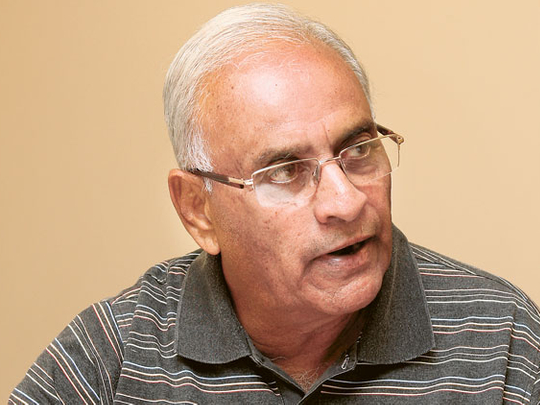
Dubai: Ever wondered why our signatures change with the passage of time? In fact, even right now, if you look closely you will notice variations in your signature each time you sign. Try it!
"One cannot produce the same signature twice," says Dhyani Vrajkishor J., an Indian signature analyst. "No matter how identical the signatures appear, there will be minor variations. This is because the pen is controlled by the hand, which in turn is controlled by the brain (mind). And when a person signs, the signature reflects the person's state of mind, the mood, [and no two states of mind are the same]."
Ancient science
Vrajkishor, 64, says signature analysis is an ancient science, a faculty of astrology, which deals with understanding an individual's personality, attitude, qualities, etc. The expert who was in town recently as part of his research for a book on people's signatures, said: "As Dubai is home to many nationalities, it's the perfect place to do a comprehensive study on signatures."
According to Vrajkishor, one's signature reveals "who you are, your virtues, your traits, strengths and weaknesses". "Your signature defines your personality and vice versa," he says, before arriving at an even more profound statement, almost a proclamation: "You can change your destiny by changing your signature."
How one signs can build or demolish dreams, he says.
For example, a signature that is "faint, abstract and untidy" will bring suffering, misconceptions, fines, and debts to its owner, while certain signatures have the power to ward off negative forces, unhappiness and obstacles.
Which leads us to the all-important question: How should a person sign?
"You should have an ‘ideal' signature, one that is proportionate, clear and legible and with no ‘cuts' (a slash across the signature). It should not be complicated — the letters should be readable and follow an upward movement, rising at 30 degrees gradually. They should not slope downwards."
But wouldn't it be easy to forge a signature that's easily readable? "If people want to forge your signature, they will do it anyway no matter how complicated, just as nothing will stop criminals from creating counterfeit currencies.
"But the fear (that it can be copied) should not discourage you from developing your ideal signature. You stand to lose a lot more by not having a legible signature than by making it difficult for others to forge it."
He says that while there are 40 kinds of ‘negative', or complicated, signatures, there is only one simple, positive, signature — which is the ideal one. "Positive signatures will bring positive results while negative signatures will lead to negative outcomes," he says, adding that a signature analyst can help one decide the ideal signature. "We are like doctors; we detect faults, negativity in signatures and warn people, and correct them."
With such high stakes hinging on just how we sign, it's only logical that there be no delay in having one. According to Vrajkishor, one should develop the ideal signature right from childhood, even suggesting that schools introduce ‘Signature reading' as a subject in order to foster a whole new progressive generation.
Even companies, when recruiting staff, should enlist the help of signature-reading experts to examine how candidates sign, he said. This would help the company identify candidates who hold more promise and are more result-oriented.
And as for one's signature changing with the passage of time, he says that's to be expected: because your prospects too change with time.











